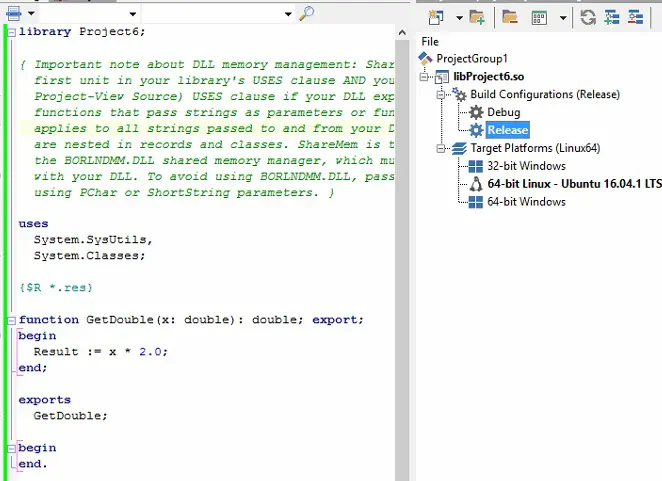The Dynamic Link Library (DLL) is stored separately from the target application and shared among different applications, compared to Static Library. The DLL is the file extension on Windows while on Linux, it is *.so (Shared Object).
The *.so/*.dll can be loaded right before the application starts or during the application’s runtime. On Windows, the Win32 API LoadLibrary is used while on Linux gcc compiler, the dlopen function is used.
Creating *.so on Windows
There are many ways and many languages to create a *.so on Linux e.g. You can write a C or C++ source code and compile it with the following command:
1 | gcc -shared -o libhello.so -fPIC hello.c |
gcc -shared -o libhello.so -fPIC hello.c
Example hello.c that exports the hello function:
1 2 3 | int hello() { return 8; // my lucky number } |
int hello() {
return 8; // my lucky number
}Let’s do this slightly differently. In this post, we learn that you can now use Delphi to compile the source code into Linux 64-bit Server native code directly.. So, let’s do this by creating a tiny Delphi DLL/*.so library. This library exports a single function that takes a double and returns its double value.
And, as you hit F9 to build, you will have the libProject6.so file, the Linux *.so library (if you change target platform to Windows, the code will be compiled into Project6.dll automatically, that is the beauty of the Delphi IDE).
How to Use the Dynamic Link Library in C++ Linux (gcc compiler)?
Copy the file to Ubuntu and create the following C/C++ source code in the same directory.
1 2 3 4 5 6 7 8 9 10 11 12 13 14 15 16 17 18 19 20 21 22 23 24 25 26 27 28 29 | // https://helloacm.com/how-to-use-the-dynamic-link-library-in-c-linux-gcc-compiler/ #include <stdio.h> #include <stdlib.h> #include <dlfcn.h> // function export from the *.so typedef double (*double_ptr)(double); int main(int argc, char **argv) { char *error; double_ptr GetDouble; void *handle; // open the *.so handle = dlopen ("./libProject6.so", RTLD_LAZY); if (!handle) { fputs (dlerror(), stderr); exit(1); } // get the function address and make it ready for use GetDouble = (double_ptr)dlsym(handle, "GetDouble"); if ((error = dlerror()) != NULL) { fputs(error, stderr); exit(1); } // call the function in *.so printf ("%f\n", (*GetDouble)(2.0)); // remember to free the resource dlclose(handle); } |
// https://helloacm.com/how-to-use-the-dynamic-link-library-in-c-linux-gcc-compiler/
#include <stdio.h>
#include <stdlib.h>
#include <dlfcn.h>
// function export from the *.so
typedef double (*double_ptr)(double);
int main(int argc, char **argv) {
char *error;
double_ptr GetDouble;
void *handle;
// open the *.so
handle = dlopen ("./libProject6.so", RTLD_LAZY);
if (!handle) {
fputs (dlerror(), stderr);
exit(1);
}
// get the function address and make it ready for use
GetDouble = (double_ptr)dlsym(handle, "GetDouble");
if ((error = dlerror()) != NULL) {
fputs(error, stderr);
exit(1);
}
// call the function in *.so
printf ("%f\n", (*GetDouble)(2.0));
// remember to free the resource
dlclose(handle);
}The RTLD_LAZY resolves undefined symbols when code from the dynamic library is executed, which is faster to open. Alternatively, RTLD_NOW resolves all undefined symbols before dlopen returns and fails if this cannot be done.
Compile the source code using (-ldl, the Interfaces for Dynamic Loader):
1 | gcc -o test test.cpp -ldl |
gcc -o test test.cpp -ldl
Run the test which should print a nice:
1 2 | root@helloacm.com:/home/delphi# ./test 4.000000 |
[email protected]:/home/delphi# ./test 4.000000
–EOF (The Ultimate Computing & Technology Blog) —
loading...
Last Post: Cloud VPS are Better Than Traditional VPS Hosting
Next Post: The Ubuntu Sub System (New Bash Shell) in Windows 10
